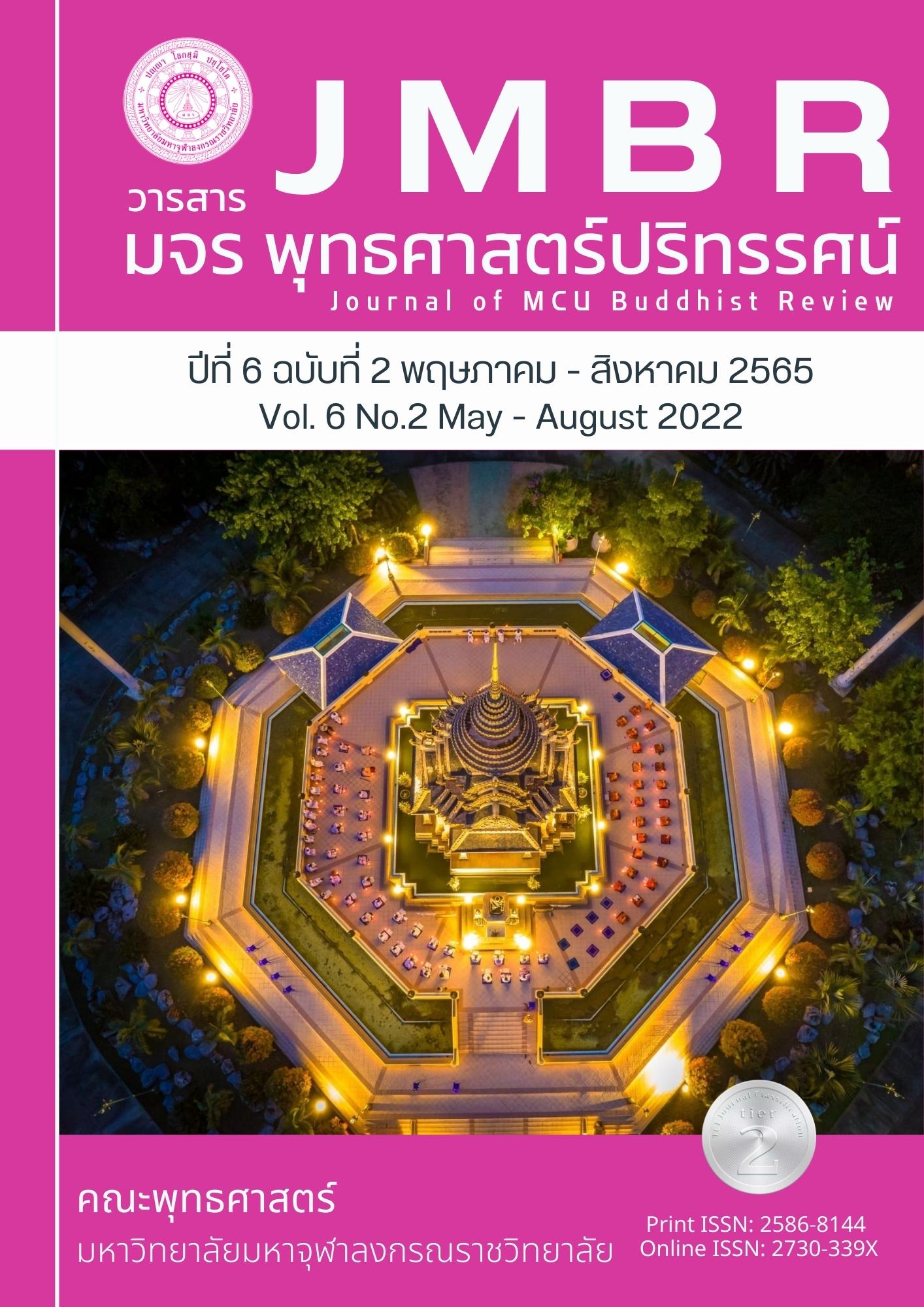พุทธทาสภิกขุ: การเปลี่ยนผ่านแนวคิดหลังสมัยใหม่ในพระพุทธศาสนาเถรวาท
Main Article Content
บทคัดย่อ
This research has two objectives to critically analyze Buddhadãsabhikkhu’s formation in proposing the postmodern ideas. This research employed the documentary research methodology. In the research, it was found that with respect to Buddhadãsabhikkhu’s postmodern ideas, they have been somehow scrutinized through the reformation of Buddhism wherein his uniqueness of those ideas was introduced; he proposed the structural guidelines for practices leading to the sameness of goal where others’ practical ways which would vary could be integrated. He was of the strong view that the ways projected by Buddhism highly embrace more ritual than practical reality. He realized that the practical formation needs to be recommended in some way by a society despite its prevalence. As regards the postmodern ideas in Buddhism, he pointed out that man has as same as the intention in the beginning and as same as the desire in the last in which it would be differentiated through its details due to individual unequal states of wisdom. Moreover, when Buddhadãsabhikkhu came to examine Buddhism regarded as folklore, he clearly pointed out that the comprehension of the world as the conventional and supramundane one completely varies resulting in the modification of religious meta-narratives which is reduced to small or local narrative by means of the community’s culture and tradition where the worldly and noble individual’s ways of life are naturally sustained by those culture and tradition. In addition, he also attempted to provide the public spheres where a worldly society and Buddhist monks’ society could be connected in terms of self-practice that would benefit others in the way that other should also follow the same manner.
Article Details

อนุญาตภายใต้เงื่อนไข Creative Commons Attribution-NonCommercial-NoDerivatives 4.0 International License.
- บทความที่ได้รับการตีพิมพ์เป็นลิขสิทธิ์ของวารสาร มจร พุทธศาสตร์ปริทรรศน์
- ข้อความใดๆ ที่ปรากฎในบทความที่ได้รับการตีพิมพ์ในวารสาร ถือเป็นความรับผิดชอบของผู้เขียนบทความ และข้อคิดเห็นนั้นไม่ถือว่าเป็นทัศนะและความรับผิดชอบของกองบรรณาธิการวารสาร มจร พุทธศาสตร์ปริทรรศน์
เอกสารอ้างอิง
เจมส์ กอร์ดอน. ฮาเบอร์มาส: มนุษย์กับพื้นที่สาธารณะ. แปลโดย วรารัก เฉลิมพันธุศักดิ์. กรุงเทพมหานคร: สวนเงินมีมา, 2559.
แบ็กกีนี, จูเลียน. อเทวนิยม ฉบับกระชับ. แปลโดย ธนาพงศ์ เกิ่งไพบูลย์. กรุงเทพมหานคร: อิลลูมิเนชันส์ เอดิชันส์, 2563.
ปีเตอร์ เอ. แจ็กสัน. พุทธทาสภิกขุ: พระพุทธศาสนานิกายเถรวาท และการปฏิรูปเชิงนวสมัยนิยมในประเทศไทย. แปลโดย มงคล เดชนครินทร์. พิมพ์ครั้งที่ 2. กรุงเทพมหานคร: จุฬาลงกรณ์ราชวิทยาลัย, 2557.
พระประชา ปสนฺโน. เล่าไว้เมื่อวัยสนธยา: อัตชีวประวัติของพุทธทาสภิกขุ. พิมพ์ครั้งที่ 3. กรุงเทพมหานคร: มูลนิธิโกมลคีมทอง, 2546.
พุทธทาสภิกขุ. สูตรเว่ยหลาง. กรุงเทพมหานคร: ไทยควอลิตี้บุ๊คส์, 2559.
พุทธทาสภิกขุ. ใจความแห่งคริสตธรรมเท่าที่พุทธบริษัทควรทราบ. พิมพ์ครั้งที่ 2. กรุงเทพมหานคร: ธรรมทานมูลนิธิ ไชยา, 2548.
พุทธทาสภิกขุ. อิทัปปัจจยตา. พิมพ์ครั้งที่ 2. กรุงเทพมหานคร: สำนักพิมพ์อรุณวิทยา, 2555.
พุทธทาสภิกขุ. คำสอนฮวงโป. กรุงเทพมหานคร: ธรรมสภา, ม.ป.ป.
พุทธทาสภิกขุ. ผู้ครองเรือน. กรุงเทพหมานคร: ธรรมสภา, 2536.
พระธรรมโกศาจารย์ (เงื่อม อินฺทปญฺโญ). ศาสนาคืออะไร. กรุงเทพมหานคร: อมรินทร์พริ้นติ้งแอนด์พับลิชชิ่ง, 2561.
ยูคิโอะ ฮายาชิ. พุทธศาสนาเชิงปฏิบัติของคนไทยอีสาน: ศาสนาในความเป็นภูมิภาค. แปลโดย พินิจ ลาภธนานนท์. กรุงเทพมหานคร: จุฬาลงกรณ์มหาวิทยาลัย, 2554.
อรุณ เวชสุวรรณ. วิวาทะ: ความเห็นไม่ตรงกันระหว่าง ม.ร.ว.คึกฤทธิ์ ปราโมช กับท่านพุทธทาสภิกขุ. พิมพ์ครั้งที่ 4. กรุงเทพมหานคร: สำนักพิมพ์อรุณวิทยา, 2543.
พิพัฒน์ พสุธารชาติ. “การหันไปสู่ศาสนาของเยอร์เกน ฮาเบอร์มาส”. ใน ฮาเบอร์มาสกับสังคมแบบหลังฆราวาส. บรรณาธิการโดย พิพัฒน์ พสุธารชาติ. กรุงเทพมหานคร: ILLUMINATIONS EDITIONS, 2562.
มหาจุฬาลงกรณราชวิทยาลัย. พระไตรปิฎกภาษาไทย ฉบับมหาจุฬาลงกรณราชวิทยาลัย. กรุงเทพมหานคร: โรงพิมพ์มหาจุฬาลงกรณราชวิทยาลัย. 2539.
Gavin D’Costa. "Postmodernity and Religious Plurality: Is a Common Global Ethic Possible or Desirable?", The Blackwell Companion to Postmodern Theology. Edited by Graham Ward. Oxford: Blackwell Publishing Ltd.,2005.
Kelvin Knight. The Macintyre Reader. Oxford: PolityPress, 1998.
R.M.Maclver. “The Deep Beauty of the Golden Rule”. Philosophy and Contemporary Issues. edited by John R. Burr and Milton Goldinger. 9th edition. New Delhi: Prentice-Hall,2004.


